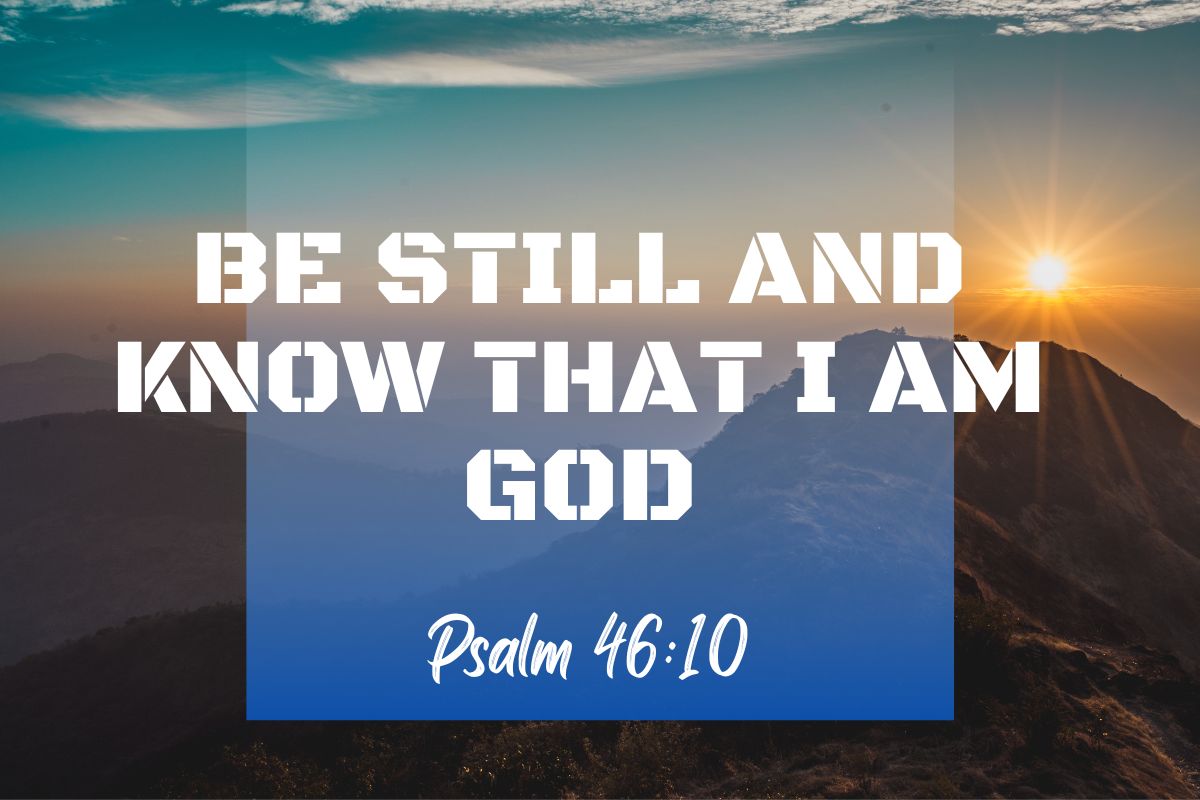Do you ever find yourself caught up in the chaos and busyness of life, yearning for a moment of calm and clarity? In the midst of our fast-paced and demanding world, it can be challenging to find peace and a sense of purpose. However, there is a timeless phrase that holds wisdom and solace: “Be still and know that I am God.” These words, originating from the book of Psalms in the Bible, carry a profound message of finding tranquility, surrendering control, and cultivating a deep connection with the divine.
Historical and Religious Significance
A. Biblical Context
The phrase “Be still and know that I am God” is found in Psalm 46:10, which states, “Be still, and know that I am God; I will be exalted among the nations, I will be exalted in the earth.” In Christianity, this verse is often interpreted as an invitation to pause, quieten the mind, and recognize the presence of God. It serves as a reminder of God’s sovereignty and the need to trust in His plans and timing.
B. Meditation and Contemplative Practices
Beyond its biblical roots, the concept of stillness and its connection to spirituality can be found in various religious and philosophical traditions throughout history. Practices such as meditation, contemplation, and silence have been used as pathways to inner peace and self-discovery. Ancient traditions like Buddhism, Taoism, and Sufism all emphasize the importance of stillness in reaching higher states of consciousness.
These practices encourage individuals to detach from the distractions of the external world and turn inward, exploring the depths of their own being. By cultivating stillness, one can gain insight into their true nature and the interconnectedness of all things.
Understanding the Phrase in Modern Context
In our modern context, the phrase “Be still and know that I am God” holds relevance and offers guidance on how to navigate the challenges of everyday life.
A. Finding Inner Peace and Calmness
In a world filled with constant noise and stimulation, finding moments of stillness becomes crucial for our well-being. It is during these moments that we can recharge, reflect, and find inner peace. By intentionally creating space for silence and solitude, we can distance ourselves from the demands of our busy lives and reconnect with our own thoughts and emotions.
Practicing mindfulness and being fully present in the current moment allows us to let go of worries about the past or the future. When we learn to be still, we discover a sense of calm that permeates our being, bringing clarity and a renewed perspective to our lives.
B. Surrendering and Trusting in a Higher Power
“Be still and know that I am God” also invites us to surrender our need for control and place our trust in a higher power. It reminds us that we are not alone in our journey and that there is a greater force guiding us. By releasing our grip on circumstances and outcomes, we open ourselves to the possibilities and opportunities that lie beyond our limited perspective.
Letting go of our ego-driven desires and surrendering to a divine plan can be liberating. It allows us to embrace uncertainty with faith and resilience, knowing that there is a purpose to every experience and that we are ultimately held and supported by a loving presence.
Scripture On Be Still And Know That I Am God
Psalm 46:10
“Be still, and know that I am God; I will be exalted among the nations, I will be exalted in the earth.”
This verse reminds us of the importance of finding inner stillness and recognizing the presence and sovereignty of God. It encourages us to pause, be calm, and trust in God’s power and authority. In the midst of life’s challenges, uncertainties, and busyness, this scripture invites us to let go of our worries and anxieties, and instead, find peace in the knowledge that God is in control.
By being still, we create space to connect with God, to listen to His voice, and to deepen our understanding of His character and promises. It is in this stillness that we can experience God’s peace and gain renewed strength. It is a reminder that God is greater than any situation we face and that He deserves our reverence and trust.
This scripture is often quoted as a source of comfort, encouragement, and guidance for those seeking solace and a deeper relationship with God. It serves as a gentle reminder to pause, be still, and fully acknowledge the presence and power of the Almighty in our lives.
Be Still And Know That I Am God meaning
The phrase “Be still and know that I am God” holds deep spiritual and theological significance. It is taken from Psalm 46:10 in the Bible, and its meaning can be interpreted in various ways.
At its core, this statement emphasizes the need for stillness and surrender in recognizing the divine presence and sovereignty of God. It encourages individuals to quiet their minds, let go of distractions, and find inner peace through a direct connection with the divine.
To “be still” implies a state of calmness, silence, and receptivity. It invites individuals to let go of their anxieties, worries, and constant busyness, and instead, embrace a moment of mindfulness and spiritual awareness. In this stillness, one can experience a profound sense of connection to a higher power and gain insight into the nature of God.
The phrase also highlights the power and authority of God. It reminds individuals that, despite the challenges and uncertainties of life, there is an ultimate source of strength and guidance. By recognizing and acknowledging the divine presence, individuals can find comfort, trust, and a sense of purpose.
Applying “Be still and know that I am God” in Daily Life
The power of this phrase lies in its practical application in our daily lives. Here are some ways in which we can incorporate the essence of “Be still and know that I am God” into our routines:
A. Quietening the Mind
Integrating meditation and breathing exercises into our daily routine can help quieten the mind and create a space for stillness. By setting aside dedicated time for reflection and self-awareness, we invite a sense of peace and clarity into our lives. Even a few minutes of silent contemplation each day can have a profound impact on our mental and emotional well-being.
In these moments of stillness, we can also cultivate gratitude by acknowledging and appreciating the blessings in our lives. By recognizing the goodness that surrounds us, we foster a sense of contentment and invite more positivity into our experiences.
B. Cultivating Spiritual Connection
Engaging in prayer, worship, or other spiritual practices allows us to deepen our connection with the divine. Whether through attending religious services, spending time in nature, or engaging in personal rituals, these practices offer a channel for expressing our faith and seeking solace.
By making room for spiritual connection, we create a space for guidance and revelation. When we are still, we can listen to the whispers of our heart and the divine wisdom that permeates the universe. This connection helps us navigate life’s challenges with grace and find strength in times of difficulty.
Conclusion
“Be still and know that I am God” holds profound wisdom for those seeking inner peace, clarity, and spiritual connection. It reminds us to pause amidst the chaos, quieten our minds, and surrender to a higher power. By incorporating stillness and faith into our lives, we can cultivate a sense of tranquility and resilience, even in the face of adversity.
Embracing the invitation to be still allows us to know ourselves on a deeper level and connect with the divine presence that resides within and around us. So, amidst the noise and haste, take a moment to be still and know that you are not alone.
FAQs
- How can I practice stillness in a busy world? In a busy world, finding stillness can be challenging but not impossible. Start by setting aside a few minutes each day for quiet reflection or meditation. Find a calm and peaceful space where you can disconnect from distractions. Focus on your breath or a mantra to anchor your attention. Gradually increase the duration of your stillness practice as it becomes a habit.
- Is “Be still and know that I am God” limited to religious contexts? While the phrase originates from a religious context, its underlying message is universal. It speaks to the need for stillness, surrender, and spiritual connection, which can be embraced by individuals of all faiths or even those who consider themselves spiritual but not religious.
- What are the benefits of meditation and contemplative practices? Meditation and contemplative practices offer numerous benefits, including reduced stress and anxiety, improved focus and clarity of mind, enhanced self-awareness, and a greater sense of inner peace. These practices have also been linked to improved emotional well-being and better physical health.
- Can stillness and spirituality help with mental health issues? Yes, stillness and spirituality can play a significant role in supporting mental health. Engaging in practices that cultivate stillness, such as meditation, can help reduce symptoms of anxiety, depression, and stress. Stillness promotes self-reflection and self-compassion, providing a foundation for emotional healing and resilience.
- How can I incorporate stillness into my daily routine? Start by setting aside dedicated time for stillness each day, even if it’s just a few minutes. Find a practice that resonates with you, such as meditation, prayer, or journaling. Create a peaceful environment, free from distractions. Gradually expand the time you dedicate to stillness as you begin to experience its benefits. Remember, consistency is key, so make it a regular part of your routine.







